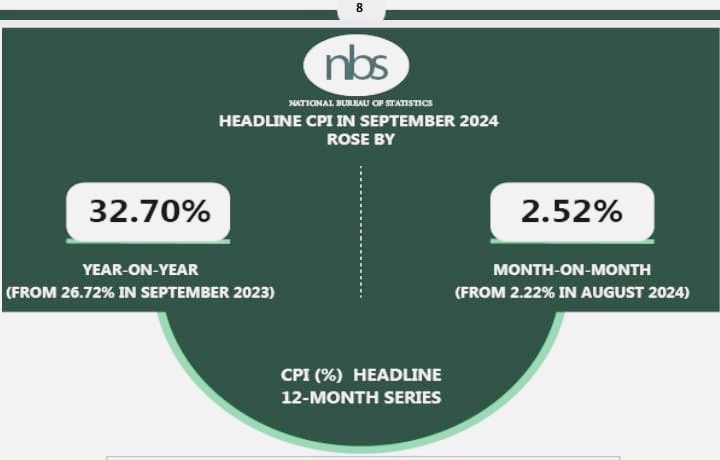Nigeria’s inflation rate rose to 32.70% in September -NBS
By Okeoghene Oghenekaro
The National Bureau of Statistics (NBS), says Nigeria’s headline inflation rate increased to 32.70 per cent in September 2024.
The Statistician-General of the Federation, Adeyemi Adeniran, revealed this in a statement issued on the Consumer Price Index (CPI) and Inflation Report for September 2024 in Abuja on Tuesday.
According to the report, the figure is 0.55 per cent points higher compared to the 32.15 per cent recorded in August 2024.
It said on a year-on-year basis, the headline inflation rate in September 2024 was 5.98 per cent higher than the rate recorded in September 2023 at 26.72 per cent.
The report said the increase in the headline index for September 2024 on a year-on-year basis was attributed to the increase in some items in the basket of goods and services at the divisional level.
It said these increases were observed in food and non-alcoholic beverages (16.94 per cent), housing, water, electricity, gas, and other fuel (5.47 per cent), clothing and footwear (2.50 per cent), and transport (2.13 per cent).
“Others were furnishings, household equipment and maintenance (1.64 per cent) education (1.29 per cent), health (0.98 per cent), and miscellaneous goods and services (0.54 per cent).
“Others include restaurants and hotels (0.40 per cent), alcoholic beverages, tobacco and kola (0.36 per cent), recreation and culture, and communication (0.22 per cent).”
In addition, the report said on a month-on-month basis, the headline inflation rate in September 2024 was 2.52 per cent, which was 0.30 per cent higher than the rate recorded in August 2024 at 2.22 per cent.
It said the percentage change in the average CPI for the 12 months ending September 2024 over the average CPI for the previous 12 months was 31.73 per cent.
“This indicates an 8.83 per cent increase compared to 22.90 per cent recorded in September 2023.”
The report said the food inflation rate in September 2024 increased to 37.77 per cent on a year-on-year basis, which was 7.13 per cent higher compared to the rate recorded in September 2023 at 30.64 per cent.
“The rise in food inflation on a year-on-year basis is caused by increases in prices of guinea corn, rice, maize grains, beans, yam, water yam, and cassava tuber.
“Others are beer (Local and Foreign), Lipton, Milo, Bournvita, vegetable oil, palm oil, among others.”
It said on a month-on-month basis, the food inflation rate in September was 2.64 per cent, which was a 0.27 per cent increase compared to the rate recorded in August 2024 at 2.37 per cent.
“The increase in food inflation on a month-on-month basis was caused by an increase in the average prices of Beer (Local and Foreign), tobacco class, vegetable oil, groundnut oil, and palm oil.
“Others are beef, gizzard, dried beef, Lipton, Milo, Bournvita, milk, and egg, among others.”
The report said that “all items less farm produce and energy’’ or core inflation, which excludes the prices of volatile agricultural produce and energy, stood at 27.43 per cent in September on a year-on-year basis.
“This increased by 5.59 per cent compared to 21.84 per cent recorded in September 2023.
“The exclusion of the PMS is due to the deregulation of the commodity by removal of subsidy.”
It said the highest increases were recorded in prices of rents, bus Journey intercity, and Journey by motorcycle, among others.
“Others are accommodation service, laboratory service, x-ray photography, consultation fee of a medical doctor, among others.”
The NBS said on a month-on-month basis, the core inflation rate was 2.10 per cent in September 2024.
“This indicates a 0.17 per cent decrease compared to what was recorded in August 2024 at 2.27 per cent.
“The average 12-month annual inflation rate was 25.64 per cent for the 12 months ending September 2024; this was 6.09 per cent points higher than the 19.55 per cent recorded in September 2023.”
The report said on a year-on-year basis in September 2024, the urban inflation rate was 35.13 per cent, which was 6.46 per cent higher compared to the 28.68 per cent recorded in September 2023.
“On a month-on-month basis, the urban inflation rate was 2.67 per cent, which increased by 0.28 per cent compared to August 2024 at 2.39 per cent.’’
The report said on a year-on-year basis in September, the rural inflation rate was 30.49 per cent, which was 5.55 per cent higher compared to the 24.94 per cent recorded in September 2023.
“On a month-on-month basis, the rural inflation rate was 2.39 per cent, which increased by 0.33 per cent compared to August 2024 at 2.06 per cent.’’
On states’ profile analysis, the report showed that in September, all items’ inflation rate on a year-on-year basis was highest in Bauchi at 44.83 per cent, followed by Sokoto at 38.74 per cent, and Jigawa at 38.39 per cent.
It, however, said the slowest rise in headline inflation on a year-on-year basis was recorded in Delta at 26.35 per cent, followed by Benue at 26.90 per cent, and Katsina at 27.71 per cent.
The report, however, said in September 2024, all items inflation rate on a month-on-month basis was highest in Sokoto 4.63 per cent, followed by Taraba at 4.07 per cent, and Anambra at 3.74 per cent.
“Kwara at 1.14 per cent, followed by Cross River at 1.78 per cent and Lagos at 1.82 per cent recorded the slowest rise in month-on-month inflation.”
The report said on a year-on-year basis, food inflation was highest in Sokoto at 50.47 per cent, followed by Gombe at 44.09 per cent, and Yobe at 43.51 per cent.
“Kwara at 32.45 per cent, followed by Rivers at 32.80 per cent and Kogi at 32.83 per cent recorded the slowest rise in food inflation on a year-on-year basis.’’
The report, however, said on a month-on-month basis, food inflation was highest in Sokoto at 5.94 per cent, followed by Taraba at 5.76 per cent, and Bayelsa at 4.44 per cent.
“Kwara at 0.88 per cent, followed by Cross River at 1.29 per cent and Kogi at 1.45 per cent, recorded the slowest rise in inflation on a month-on-month basis.” (NAN) (www.nannews.ng)
Edited by Abiemwense Moru
Published By
- Agriculture and Environment Desk Controller/Website Content Manager.
Has also recently published
 ForeignJune 30, 2025TYGF President advocates international partnerships for economic diversification
ForeignJune 30, 2025TYGF President advocates international partnerships for economic diversification Economy/BusinessJune 30, 2025Tinubu empowers ICRC to implement approval thresholds for PPP projects
Economy/BusinessJune 30, 2025Tinubu empowers ICRC to implement approval thresholds for PPP projects HealthJune 30, 2025NHIA sanctions 96 health providers, HMOs
HealthJune 30, 2025NHIA sanctions 96 health providers, HMOs General NewsJune 30, 2025Beware of fake loan portal, NELFUND alerts students
General NewsJune 30, 2025Beware of fake loan portal, NELFUND alerts students





